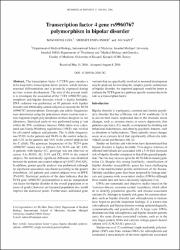| dc.contributor.author | Özel, Mavi Deniz | |
| dc.contributor.author | Önder, Mehmet Emin | |
| dc.contributor.author | Sazcı, Ali | |
| dc.date.accessioned | 10.07.201910:49:13 | |
| dc.date.accessioned | 2019-07-10T19:36:56Z | |
| dc.date.available | 10.07.201910:49:14 | |
| dc.date.available | 2019-07-10T19:36:56Z | |
| dc.date.issued | 2016 | en_US |
| dc.identifier.citation | Özel, M. D., Önder, M. E. ve Sazcı, A. (2016). Transcription factor 4 gene rs9960767 polymorphism in bipolar disorder. Biomedical Reports, 5(4), 506-510. https://dx.doi.org/10.3892/br.2016.742 | en_US |
| dc.identifier.issn | 2049-9434 | |
| dc.identifier.uri | https://hdl.handle.net/20.500.12511/1290 | |
| dc.identifier.uri | https://dx.doi.org/10.3892/br.2016.742 | |
| dc.description.abstract | The transcription factor 4 (TCF4) gene encodes a helix-loop-helix transcription factor protein, which initiates neuronal differentiation and is primarily expressed during nervous system development. The aim of the present study is to investigate the association of the TCF4 rs9960767 polymorphism and bipolar disorder, which is highly heritable. DNA isolation was performed on 95 patients with bipolar disorder and 108 healthy control subjects to examine the TCF4 rs9960767 polymorphism. Genotypic and allelic frequencies were determined using the polymerase chain reaction-restriction fragment length polymorphism method designed in our laboratory. Statistical analysis was performed using ?2 test within the 95% confidence interval. Odds ratios were calculated and Hardy-Weinberg equilibrium (HWE) was verified for all control subjects and patients. The A allele frequency was 95.8% in the patients and 94.4% in the control subjects, and 4.2% in the patients and 5.6% in the control subjects for the C allele. The genotype frequencies of the TCF4 gene rs9960767 variant were as follows: AA, 91.6% and AC, 8.4% in patients with bipolar (CC genotype was not observed in cases); AA, 89.8%; AC, 9.3% and CC, 0.9% in the control subjects. No statistically significant difference was identified between the patients and control subjects (?2=0.937; P=0.626). In addition, gender specific analysis was performed, although no significant association was found according to the gender distrubition. All patients and control subjects were in HWE (P>0.05). Statistical analysis of the data indicates that the TCF4 gene rs9960767 polymorphism is not an independent risk factor for bipolar disorder in the overall population or in terms of gender; however, an increased population size would improve the statistical power. Furthermore, additional gene variants that are specifically involved in neuronal development may be analyzed for revealing the complex genetic architecture of bipolar disorder. An improved approach would be better to evaluate the TCF4 gene in a pathway specific manner due to its role as a transcription factor. | en_US |
| dc.description.sponsorship | Kocaeli University | en_US |
| dc.language.iso | eng | en_US |
| dc.publisher | Spandidos Publications | en_US |
| dc.rights | info:eu-repo/semantics/openAccess | en_US |
| dc.subject | Bipolar Disorder | en_US |
| dc.subject | Polymorphism | en_US |
| dc.subject | Rs9960767 | en_US |
| dc.subject | Single Nucleotide Polymorphism | en_US |
| dc.subject | Transcription Factor 4 Gene | en_US |
| dc.title | Transcription factor 4 gene rs9960767 polymorphism in bipolar disorder | en_US |
| dc.type | article | en_US |
| dc.relation.ispartof | Biomedical Reports | en_US |
| dc.department | İstanbul Medipol Üniversitesi, Uluslararası Tıp Fakültesi, Temel Tıp Bilimleri Bölümü, Tıbbi Biyoloji Ana Bilim Dalı | en_US |
| dc.identifier.volume | 5 | en_US |
| dc.identifier.issue | 4 | en_US |
| dc.identifier.startpage | 506 | en_US |
| dc.identifier.endpage | 510 | en_US |
| dc.relation.publicationcategory | Makale - Uluslararası Hakemli Dergi - Kurum Öğretim Elemanı | en_US |
| dc.identifier.doi | 10.3892/br.2016.742 | en_US |
| dc.identifier.scopusquality | Q1 | en_US |


















